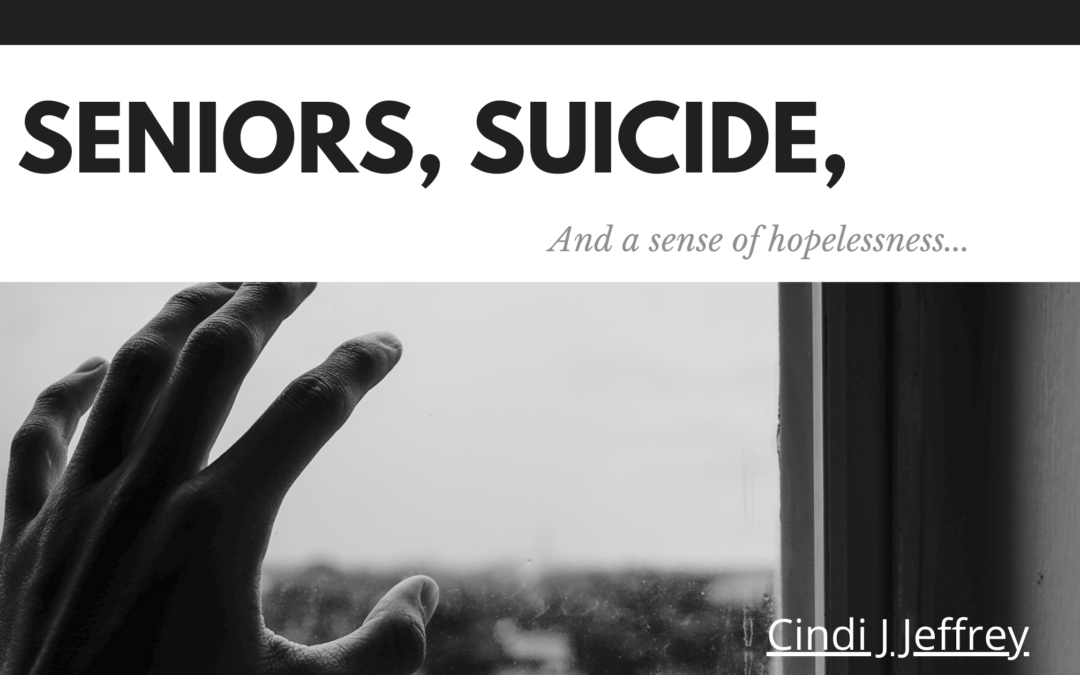Seniors and suicide
According to the American Association of Marriage and Family Therapy, “seniors make up 12% of our population but are 18% of all suicide deaths”. This study was created pre-covid. And while the statistics are yet to be available, I would expect these numbers will rise drastically as our oldest community members continue to live in isolation.
In the state of Nebraska, suicide is the 7th leading cause of death for ages 55-64 and the 18th leading cause of death for those over 65 (Suicide Facts and Figures, Nebraska 2020). Additionally, Census.gov reports that 14% of Nebraska residents are seniors and 30% of them are living alone. That leaves a high percentage of that 70% residing in long term care or assisted living facilities. And due to Covid 19, the majority of those facilities are on lockdown.
What Lockdown Looks like
If you have ever been to a senior community, you know that community is the key word. We expect a sense of community, interaction and activity. Now due to Covid 19, you are often met with a stifling silence. The new normal upon entering a facility is:
- Document on a questionnaire your current symptoms.
- Take your temperature and record it.
- Don a mask.
And this is just for those who are able to enter. Since March of 2020, essential workers are the only people who are permitted into these facilities.
Staff suffers too
I’ll be honest as my heart hurts for the administrators and staff. They are in these positions out of true love and respect for the people they work. They are taking this personally and are going above and beyond to be more on on the floor and interacting with the residents.
However, that doesn’t take the place of family visitation. In many cases, our seniors are quarantined in their rooms, looking at the same four walls daily. Visitation with family is done through a window, each placing their hands on the respective side while hiding the tears that are forming. Phone calls have taken the place of physically hearing a loved one’s voice. And hugs are no longer allowed.
During quarantine communal meals have been deemed unsafe, so they miss their dinner companions. There are no more Bingo tournaments or community sing alongs. They can’t meet a friend and work on a puzzle together, nor can they do group crafts. The lack of connecting with others can lead a normally “emotionally healthy” person into situational depression.
What Depression Looks like
Depression looks differently in an aging loved one. As many of our seniors also suffer from memory loss and/or dementia, they truly have no understanding of their current situation. This creates additional stressors on both the individual resident and the staff.
A person who once enjoyed activities may now show no interest in t hose activities. They may refuse to color, put together a puzzle or or even participate in physical therapy. Their appetite begins to decline and there is little interest in a favored dessert. A once smiling person may become tearful and express a loss of hope and/or a desire to not go on.
While they may not have a plan to end their life, their overall hopelessness has taken over any shred of their current situation changing. As the time slips by, so does their physical and emotional strength. They present as angry, withdrawn, and are failing to thrive.
What you can do
Realize the effect that Covid 19 is having on this lost population.
- Recognize a change in bevior in a loved one and report it to their respective caregivers. Don’t minimize the overall impact of this pandemic.
- Be honest when talking with your family member and acknowledge how hard this is. Often we try to protect or fragile family members and they may misinterpret your apathy as a disregard for their situation.
- Make an effort to communicate. Make the call, send the letter or the text. Let them know you are thinking of them.
- Send them a care package of their favorite items. Many who are used to doing their own shopping are now unable to do so and are missing having the things they love around them.
- Send notes, cards and drawing to a local facility and let them know the outside world cares.
Recognize that your loved one is grieving. They are grieving the life they once lived. Yes, it is hard to be around them when they are feeling so hopeless. This is about providing hope in an unprecedented time to someone who desperately needs a thread of hope to cling to. And for the unknown future, this is our new normal.
Thoughts? Share with us your experiences with this situation. Email me at:cindijjeffrey@gmail.com.

